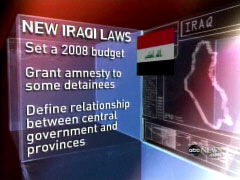For most of the Iraq war, the national media has suggested to
the public that there are two sides of the story on Iraq: the
version painted by President Bush and his spokesmen, and the
"reality"
 that
Americans see in the media. But when things go well in Iraq, do
the networks take any steps to acknowledge reality? Or do they
keep a lid on the good news?
that
Americans see in the media. But when things go well in Iraq, do
the networks take any steps to acknowledge reality? Or do they
keep a lid on the good news?
On July 1, the Associated Press reported that the White House
notified Congress this spring that Iraq's efforts on 15 of 18 benchmarks
of progress were "satisfactory" — almost twice as many as the eight
benchmarks checked off a year ago. On FNC's Special Report that
evening, anchor Brit Hume predicted: "I suspect that this broadcast
tonight — and maybe some others on this channel — are the only ones who
are going to make a headline out of this. This is not going to be a big
story elsewhere."
Hume was right. Neither CBS Evening News nor NBC Nightly
News mentioned Iraq at all. On ABC's World News, anchor
Charles Gibson read a short update about "increasing dangers for U.S.
troops in Afghanistan" since "in the month of June there were 28
American fatalities in Afghanistan, just one less than died in Iraq last
month." NBC was the only network that put the words "Iraq" and
"progress" together last week, in an item on the July 4 Today on
optimism that American soldiers have in Iraq.
Newspapers also downplayed the positive progress report. The
Washington Post put the news on page A-8 on Wednesday. But on
Thursday, the top of the Post's front page highlighted "A Shortage of
Troops in Afghanistan." Iraq is improving, so Post reporter Josh
White shifted the bad-news spotlight back to the other battlefront:
"Violence in Afghanistan has increased markedly over recent weeks, with
June the deadliest month for U.S. troops since the war began in 2001."
On his "In Memoriam" segment on ABC's This Week, George
Stephanopoulos announced: "You may have noticed that this is the first
week since the beginning of the Iraq war where the Pentagon released the
names of no combat-related deaths in Iraq." That's more than a short
afterthought. If the Democrats were put in charge of the Pentagon, it
might lead the program.
For more, see the
July 2
CyberAlert.














 that
Americans see in the media. But when things go well in Iraq, do
the networks take any steps to acknowledge reality? Or do they
keep a lid on the good news?
that
Americans see in the media. But when things go well in Iraq, do
the networks take any steps to acknowledge reality? Or do they
keep a lid on the good news? 